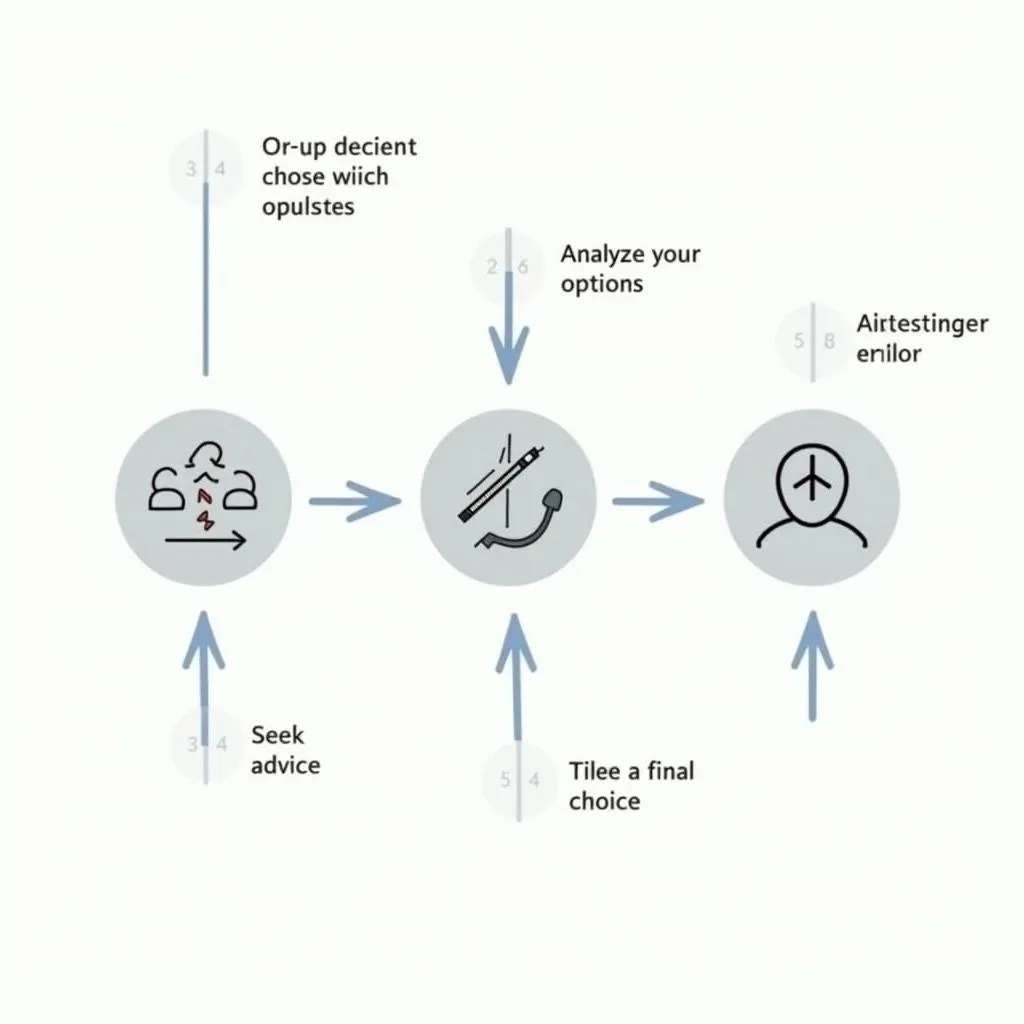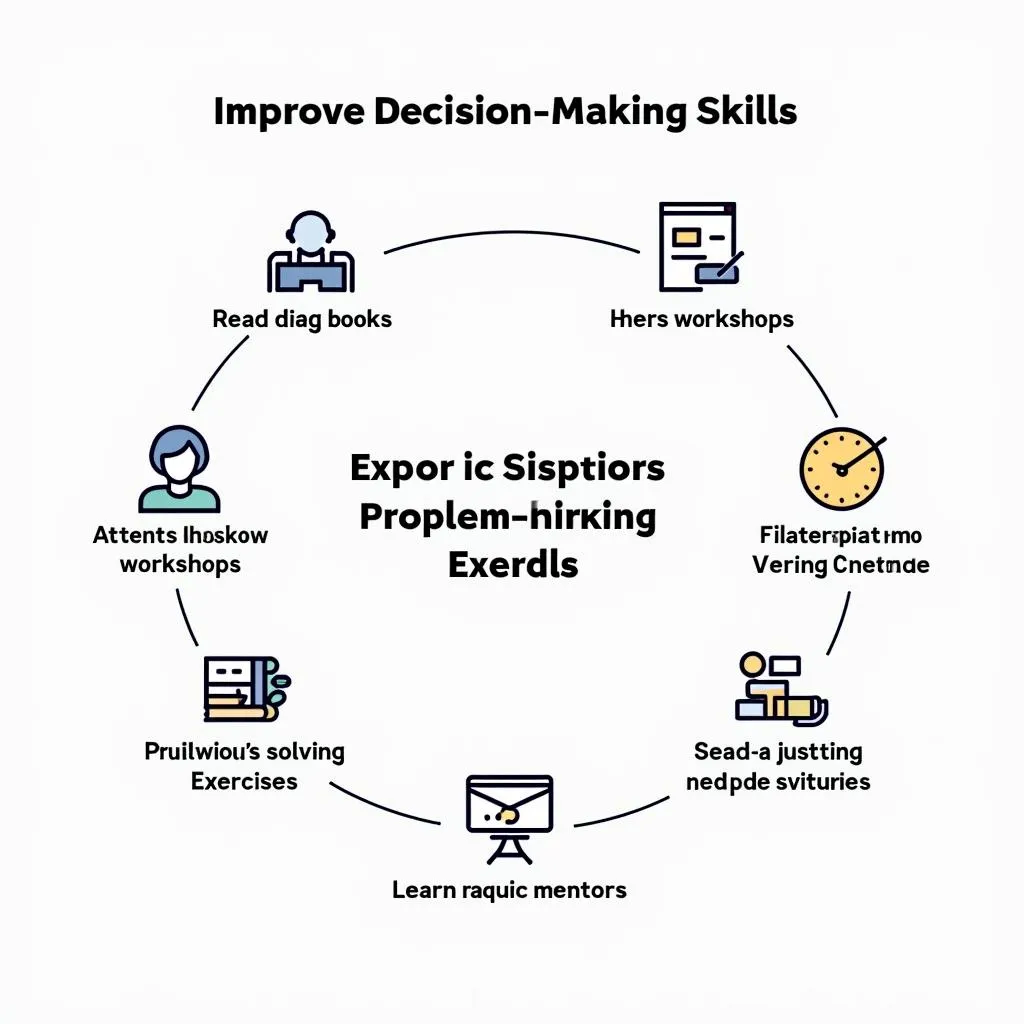The IELTS Speaking test often includes questions about people we admire or look up to. One common topic is describing someone you admire for their decision-making abilities. This theme has appeared frequently in past IELTS exams and is likely to remain relevant in future tests. Let’s explore how to effectively answer questions related to this topic and maximize your speaking score.
Nội dung bài viết
Part 1: Introduction and Interview
In this section, the examiner may ask you some general questions about decision-making. Here are a few potential questions and sample answers:
- Do you consider yourself a good decision-maker?
Sample answer (Band 7-8):
“I’d say I’m generally a competent decision-maker. I tend to weigh the pros and cons carefully before making important choices. However, I sometimes struggle with overthinking minor decisions, which is something I’m working on improving.”
- How do you usually make important decisions?
Sample answer (Band 8-9):
“When faced with significant decisions, I typically follow a structured approach. First, I gather relevant information from various sources. Then, I analyze the potential outcomes of each option. I also like to seek advice from people I trust who have experience in the area. Finally, I trust my instincts to guide me towards the best choice. This method has served me well in both personal and professional contexts.”
 Decision-making process illustration
Decision-making process illustration
Part 2: Long Turn (Cue Card)
Here’s a sample cue card related to the topic:
Describe a person you admire for their decision-making skills
You should say:
- Who this person is
- How you know them
- What kind of decisions they make
- Why you admire their decision-making skills
And explain how their decision-making skills have influenced you.
Sample answer (Band 8-9):
“I’d like to talk about my former manager, Sarah Thompson, whom I greatly admire for her exceptional decision-making abilities. I had the privilege of working under her guidance for three years at a multinational tech company.
Sarah was responsible for making crucial decisions that impacted our entire department, ranging from strategic planning and resource allocation to crisis management. What set her apart was her ability to navigate complex situations with remarkable clarity and foresight.
I admire Sarah’s decision-making skills for several reasons. Firstly, she had an uncanny ability to synthesize vast amounts of information quickly and identify the core issues at hand. Secondly, she always considered the long-term implications of her choices, not just the immediate outcomes. Lastly, Sarah was unafraid to make tough calls when necessary, even if they were unpopular in the short term.
Her approach to decision-making has profoundly influenced me. I’ve learned the importance of gathering comprehensive data before jumping to conclusions. Sarah also taught me to think several steps ahead, anticipating potential consequences of each decision. Perhaps most importantly, I’ve adopted her habit of seeking diverse perspectives before finalizing any significant choice.
In conclusion, Sarah’s decision-making prowess not only led our team to numerous successes but also served as an inspiring example of leadership. Her influence continues to shape my own approach to problem-solving and decision-making in both my professional and personal life.”
Follow-up questions:
- How has this person’s decision-making style affected their career?
Sample answer (Band 7-8):
“Sarah’s exceptional decision-making skills have propelled her career significantly. Her ability to make sound choices under pressure has earned her numerous promotions and increased responsibilities within the company. Moreover, her reputation for strategic thinking has made her a sought-after consultant in the industry.”
- Do you think decision-making skills can be learned or are they innate?
Sample answer (Band 8-9):
“While some individuals may have a natural predisposition for effective decision-making, I firmly believe these skills can be cultivated and refined over time. Through experience, education, and conscious effort, anyone can improve their ability to make sound judgments. It’s a matter of developing critical thinking, emotional intelligence, and the capacity to analyze complex information. Additionally, learning from both successes and failures plays a crucial role in honing one’s decision-making prowess.”
 Developing decision-making skills
Developing decision-making skills
Part 3: Two-way Discussion
Examiner: Let’s talk more about decision-making in society. How do you think technology has affected the way people make decisions?
Sample answer (Band 7-8):
“Technology has significantly impacted decision-making processes in modern society. On one hand, we now have access to vast amounts of information at our fingertips, which can help us make more informed choices. Tools like big data analytics and artificial intelligence are also assisting in complex decision-making scenarios, especially in fields like finance and healthcare.
However, the abundance of information can sometimes lead to analysis paralysis, where people struggle to make decisions due to information overload. Additionally, the rapid pace of technological change means we often have to make decisions quickly, sometimes without fully understanding the long-term implications.”
Sample answer (Band 8-9):
“The advent of technology has revolutionized decision-making across various spheres of society. We’re now in an era of data-driven decision-making, where advanced algorithms and machine learning can process enormous datasets to identify patterns and predict outcomes with remarkable accuracy. This has led to more evidence-based decisions in fields ranging from public policy to business strategy.
However, this technological influence is not without its challenges. The algorithmic nature of many decision-making tools can sometimes overlook nuanced human factors or perpetuate existing biases if not carefully designed and monitored. Moreover, the instant gratification culture fostered by technology may encourage hasty decision-making at the expense of thoughtful deliberation.
Interestingly, technology has also democratized decision-making in many ways. Social media and online platforms have given individuals greater power to influence collective decisions, from consumer choices to political outcomes. This shift towards more participatory decision-making is reshaping power dynamics in society.
In conclusion, while technology has undoubtedly enhanced our decision-making capabilities in many respects, it also requires us to develop new skills – such as digital literacy and critical thinking – to navigate this information-rich landscape effectively.”
Examiner: Do you think leaders today face more challenging decisions compared to those in the past?
Sample answer (Band 8-9):
“I believe contemporary leaders face a unique set of challenges that make decision-making particularly complex in today’s world. The interconnectedness of global systems means that decisions often have far-reaching consequences beyond immediate contexts. For instance, a policy change in one country can trigger ripple effects across international markets and geopolitical relationships.
Moreover, the pace of change in our modern era is unprecedented. Technological advancements, social movements, and environmental issues evolve rapidly, requiring leaders to make decisions with incomplete information and uncertain outcomes. This contrasts with historical contexts where change occurred more gradually, allowing for more time to contemplate decisions.
Another factor is the increased transparency and scrutiny facilitated by modern media and communication technologies. Leaders’ decisions are now dissected and debated in real-time on global platforms, adding pressure to the decision-making process.
However, it’s worth noting that leaders today also have access to sophisticated tools and resources that weren’t available in the past. Advanced data analytics, global communication networks, and interdisciplinary expertise can all aid in making more informed decisions.
In conclusion, while the fundamental nature of leadership decisions – balancing various interests and navigating uncertainty – remains similar, the complexity, speed, and visibility of modern decision-making arguably present greater challenges than ever before.”
 Challenges faced by modern leaders
Challenges faced by modern leaders
Key Vocabulary and Phrases for High Scores
-
Strategic thinking /strəˈtiːdʒɪk ˈθɪŋkɪŋ/ (noun phrase): The ability to plan for the future with insight and innovation.
Example: “Her strategic thinking helped the company navigate through turbulent market conditions.” -
Weigh the pros and cons /weɪ ðə prəʊz ænd kɒnz/ (idiom): To consider the advantages and disadvantages before making a decision.
Example: “Before accepting the job offer, I carefully weighed the pros and cons of relocating to a new city.” -
Foresight /ˈfɔːsaɪt/ (noun): The ability to predict what might happen in the future and plan accordingly.
Example: “The CEO’s foresight in investing in renewable energy proved beneficial as environmental regulations tightened.” -
Critical thinking /ˈkrɪtɪkl ˈθɪŋkɪŋ/ (noun phrase): The objective analysis and evaluation of an issue to form a judgment.
Example: “Developing strong critical thinking skills is essential for making sound decisions in complex situations.” -
Navigate complexity /ˈnævɪgeɪt kəmˈpleksəti/ (verb phrase): To successfully deal with complicated or intricate situations.
Example: “A good leader must be able to navigate complexity and guide their team through uncertain times.” -
Data-driven decision-making /ˈdeɪtə ˈdrɪvn dɪˈsɪʒn ˈmeɪkɪŋ/ (noun phrase): The practice of basing decisions on data analysis rather than intuition or observation alone.
Example: “Many modern businesses are adopting data-driven decision-making to improve their operational efficiency.”
Describe a sport you have learned to play can also involve decision-making skills, as athletes often need to make split-second choices during gameplay.
Examiner’s Advice
To excel in the IELTS Speaking test when discussing decision-making skills:
- Use a variety of vocabulary related to decision-making, leadership, and problem-solving.
- Provide specific examples to illustrate your points, drawing from personal experiences or observations.
- Demonstrate your ability to analyze complex issues by discussing both the positive and negative aspects of decision-making processes.
- Practice speaking about different types of decisions and their implications to build fluency on this topic.
- Develop your ideas fully, especially in Part 3, by considering broader societal implications of decision-making.
Remember, the key to a high score is not just in what you say, but how you say it. Aim for clarity, coherence, and depth in your responses.
Describe a member of a team that you know could be another opportunity to discuss decision-making skills in a collaborative context.
By following these guidelines and practicing regularly, you’ll be well-prepared to discuss decision-making skills and related topics in your IELTS Speaking test.


